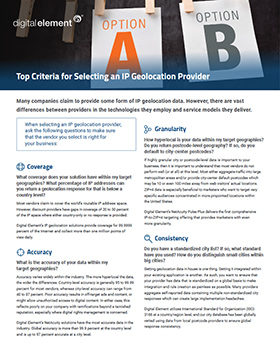Many companies claim to provide some form of “IP geolocation data”; however, there are vast differences between providers in the technologies they employ and service models they deliver. When selecting an IP geolocation and intelligence data provider, ask the following questions to make sure that the vendor you select is right for your business:
1. Coverage
What coverage does your solution have within my target geographies? What percentage of IP addresses can you return a geolocation response for that is below a country level?
Most vendors claim to cover the world’s routable IP address space. However, discount providers have gaps in coverage of 20 to 30 percent of the IP space where either country-only or no response is provided.
Digital Element’s IP geolocation solutions provide coverage for 99.9999 percent of the Internet and collect more than one million points of view daily.
2. Accuracy
What is the accuracy of your data within my target geographies?
Accuracy varies widely within the industry. The more hyperlocal the data, the wider the differences. Country-level accuracy is generally 95 to 99.99 percent for most vendors, whereas city-level accuracy can range from 40 to 97 percent.
Poor accuracy results in off-target ads and content, or might allow unauthorized access to digital content. In either case, this reflects poorly on your company with ramifications beyond a tarnished reputation, especially where digital rights management is concerned.
Digital Element’s NetAcuity solutions have the most accurate data in the industry. Global accuracy is more than 99.9 percent at the country level and is up to 97 percent accurate at a city level.
3. Granularity
How hyperlocal is your data within my target geographies? Do you return postcode-level geography? If so, do you default to city-center postcodes?
If highly granular city or postcode-level data is important to your business, then it is important to understand that most vendors do not perform well (or at all) at this level.
Most either aggregate traffic into large metropolitan areas and/or provide city-center default postcodes which may be 10 or even 100 miles away from web visitors’ actual locations.
ZIP+4 data is especially beneficial to marketers who want to target very specific audiences concentrated in more pinpointed locations within the United States.
Digital Element’s NetAcuity Pulse Plus delivers the first comprehensive IP-to-ZIP+4 targeting offering that provides marketers with even more granularity.
4. Consistency
Do you have a standardized city list? If so, what standard have you used? How do you distinguish small cities within big cities?
Getting geolocation data in house is one thing. Getting it integrated within your existing application is another. As such, you want to ensure that your provider has data that is standardized on a global basis to make integration and rule creation as painless as possible.
Many providers aggregate self-reported data containing multiple non-standardized city responses which can create large implementation headaches.
Digital Element utilizes International Standard for Organization (ISO) 3166 at a country/region level, and our city database has been globally vetted using data from local postcode providers to ensure global response consistency.
5. Technology
How is your dataset derived?
Most IP geolocation vendors simply repackage publically available (free) Whois registration data, and some supplement with user-supplied data.
Simple Whois information and/or user-supplied data, however, are not reliable methods for accurate geolocation when used in isolation. Again, if coverage, accuracy and granularity are important to your business, select a vendor that integrates multiple methodologies including network infrastructure analysis and user-validated location feedback, as well as has a team of data analysts that double checks automated data collection methods and runs quality-assurance checks.
Digital Element delivers the most accurate and granular data available because our team of engineers and analysts leverages multiple data sources and patented techniques. Our partner data is verified in house to ensure reliability.
6. Verification
Have your data accuracy and methods been independently reviewed by third-party auditors?
If accuracy is important, make sure your vendor can “put its money where its mouth is” and provide you with independent documentation of its data accuracy. Importantly, be sure that any audits assess the data itself, not just the methods used to collect the data. Also, ensure that any audits have been conducted by a reputable organization.
Digital Element has received accreditation from the Media Rating Council (MRC) for the geographic location identifications reported by its NetAcuity platform.
7. Reputation
Who are your customers, and what results have they achieved with your data?
If your application has the potential to impact your company’s reputation, you will want to know that you have selected a provider with a reputation for quality and reliability―and with a proven track record of success.
Take a look at each vendor’s client list and ask for tangible client results and successes.
Digital Element processes hundreds of billions of IP geolocation lookups
per day for its clients, which include the world’s largest websites, brands,ad networks, social media platforms, retailers and more.
8. Data Breadth
What other datasets do you offer in addition to IP-to-geography information?
Information such as proxy type; connection type/speed; home/business user; industry classifications; domain name; ISP; company name; organization name; and more can be impactful datasets for creating more meaningful user experiences.
Ask your provider what types of data they offer beyond geography.
With Digital Element’s NetAcuity solution, you can perfect audience segmentation capabilities and targeting based on 59+ parameters in addition to location, including connection type/speed, mobile carrier, proxy type, ISP, Wi-Fi intelligence, and demographics.
